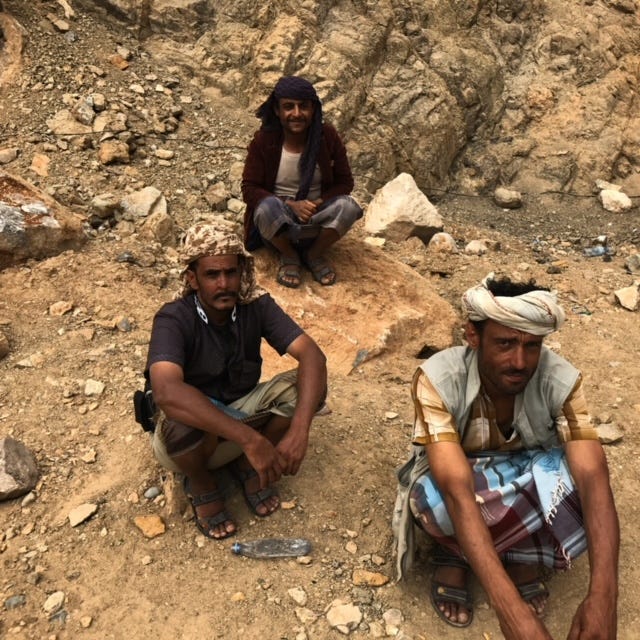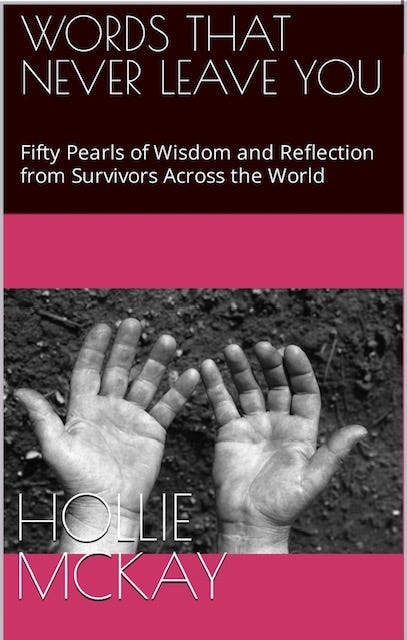Tea with the Houthis and clarifying their "Death to America" slogan
Digging into the Houthi mindset
With everything happening in the Middle East, in particular the Red Sea attacks orchestrated by the Yemen-based Houthi militia group, I wanted to revisit my conversations with the group, which continue via WhatsApp from time to time. (Updated with relevant information, of course).
I have spent quite a bit of time going in and out of Yemen at the height of its war there with different parties to the conflict, trying to understand the psyche of the various players and paint a picture that people could understand of this horrible and largely forgotten war. On one particular occasion, I traveled across Yemen and back into neighboring Saudi Arabia. From there, I flew to Muscat, Oman, to sit down with some Houthi leadership. Oman remains a neutral player in matters of foreign affairs. Still, it houses several top Houthi figures who travel there between fighting stints in the Yemen capital of Sanaa, which the Houthis have maintained control of since late 2014.
No understanding of war is complete without giving all sides a hearing. It doesn’t mean you need to agree, but it is imperative that we at least try to understand where the adversary is coming from.
In the late summer of 2019, I met with four high-brass Houthi figures in a conference room inside a hotel in Muscat, in addition to a local translator. While none of the men spoke English, they nodded and understood what I was saying, perhaps more than they let on. The men, who all appeared in their late twenties to late thirties, wore traditional Yemeni dress, including the distinguished daggers in their belts. Although a status symbol of “manhood,” the sword-like ornaments continue to be used in fighting and as a means of self-defense when necessary.
Over traditional Yemeni coffee that is pale yellow with a tea-like look and consistency, the Houthis assure me that they are an “open book” and have nothing to hide. I begin by cutting right to the chance and asking what it will take for them to lay down their arms.
For years, the international community and UN top brass have tried to orchestrate a formal end to the bloody war in Yemen, waged between a Saudi Arabia-led coalition and the Iran-aligned Houthi insurgency group. It remains in a sort of flimsy cessation of hostilities holding pattern that could erupt at any second.
And while permanent peace in the blood-spattered country remains a beleaguered hope still far from reality, as the humanitarian crisis continues to spiral and the death count rises, the rebel group is holding firm and blaming the UN for sending the peace process “backward.”
“We can say right now the political process is suspended,” Mohamed Abdel Salam, the spokesman for the Houthi group, known officially as Ansar Allah – “Helpers of God ” – told me.
Salam says that the UN continues offering “peace” plans that counter their values.
“He (the Special Envoy) has a plan called ‘the principles.’ But it is a weak plan. He talked about partial solutions like Hodeida Port and others on the humanitarian level; he didn’t do anything. He didn’t release any prisoners, he didn’t break the surrounding Sana’a and Aden [conflict], he didn’t open the airport, he couldn’t arrange for any transfer of patients and injuries,” Salam lamented. “On an economic level, he couldn’t push the other party to pay salaries, so we can say there is nothing tangible regarding any political process.”
The Yemeni civil war rages on as the Saudi Arabian-led coalition supporting Yemen’s internationally recognized government tries to take back the capital city of Sana’a. Yet Salam insists that the group is willing to lay down arms – but with clear caveats.
“The solution” from the Houthi point of view must be “comprehensive” rather than a fragmented agenda that looks at single issues, Salam insisted.
“What we mean by a comprehensive solution plan is that there should be a new presidency and a transitional presidency at least. The transitional government should have specific tasks to accomplish within a specific period,” he said. “The president should be someone all parties accept, and he shouldn’t be a part of the crisis itself.”
However, some analysts say acceptance from all sides is no longer a realistic end to the conflict.
“The only way this is resolved is if the Saudi-led coalition takes full control of the area and pushes the Iranian rebels out,” Jeff Bardin, chief intelligence officer of Treadstone 71, told me at the time. “Current delays allow both sides to look as if they are standing down when reinforcements and preparation for a final battle at the post is imminent. This will be bloody, long and protracted, something the coalition does not want.”
The Saudi-heralded coalition, which received some logistical support from the U.S. and U.K. and buys weapons from American companies, intervened over its border in March 2015 to usurp the Houthi’s control of the capital city Sana’a and restore the internationally-recognized Yemen government, and its then-standing President Abdrabbuh Mansur Hadi, from exile. While the coalition at the time was adamant that Hadi represented a legitimate government and the right to lead, the Houthis perceived him as being “too controlled” by Saudi Arabia even before the war broke out.
“The presidency should be a committee. There should be a head plus four individuals, and they should represent all sectors of society, and it should be a unity government that combines all parties,” Salam explained. “This government should not look down on or go against any party in Yemen. They should be part of it, part of that government. This authority should be accepted by all parties.”
In 2022, Hadi stepped down and transferred executive authority to the Presidential Leadership Council. However, this isn’t enough to quell the Houthi movement. Deep distrust still permeates not only the warring parties, but within the Houthi Movement itself. As an example, the Houthis killed Yemen’s former President Saleh in December of 2018. Saleh, who once fought against the rebel outfit, switched sides and mobilized their support before the Sana’a takeover in 2014 to regain power after being constitutionally forced to pass the baton to his then-vice president, Hadi.
The brutal and sudden death of Saleh in the streets of Sana’a (his body paraded for observers to take note) was primarily viewed as being something of a public relations mistake by many Yemenis and international observers, illuminating their barbarity and sewing doubt that they could ever be considered as a legitimate power. Salam shrugged off the criticism and claimed that the rebel group has no regrets and that Saleh’s death has made them “stronger” as they believe he was secretly colluding with the enemy.
“Many problems were solved because of his killing. Saleh was an opportunist; he would take whatever was there,” Salam explained. “What he got was a natural result. We think any future of Yemen would be more stable without Saleh.”
This brutally honest boasting about slaying one of their own strikes a deep chord: these men do not hesitate to fight on the inside and the outside. Violence is deeply ingrained in their mindset and acted upon without a flinch. This is a group that runs by its own rules and doesn’t hesitate to take out anyone who stands in their way.
While Salam denied that the Houthis receive significant amounts of support from the Shi’a-governed Iran, dismissing it as “Saudi Arabian propaganda to justify their war to the world,” he did elaborate on the group’s Tehran-inspired “Death to America, Death to Israel, a Curse Upon the Jews. Victory to Islam.”
“These slogans express how upset we are about the U.S. foreign policy in this region and how we think they are responsible for events in this region,” he said. “We believe that Saudi Arabia is not carrying this war against us alone. It is supported by the U.S. Therefore, the U.S. is killing children.”
U.S. involvement in the Yemen conflict has been a controversial touchstone from the beginning. Under both the Obama and Trump administrations, the U.S. supported the Saudi-led coalition by assisting with logistics such as air refueling and even firing Tomahawk missiles at radar sites operated by Houthi rebels inside Yemen. This support was in keeping with the U.S.’s strong ties to Saudi Arabia and its reliance on Riyadh to help fight Al Qaeda and ISIS in southern pockets of Yemen. However, amid much controversy over Saudi’s chillingly high deal toll and the lack of Congressional authorization for the war, the Biden administration vowed to end involvement shortly after taking office in early 2021.
Moreover, I can’t leave the interview without addressing allegations of Houthis kidnapping young Yemenis and forcing them to become child soldiers, in addition to sordid tales and abuse. While I have interviewed victims who pointed the finger at both sides of the war, the scales tipped much more to Houthis committing this widely recognized war crime. Salam dismissed the claim with a flick of the hand, insisting that it was all propaganda designed to “make them look bad.” Yet, I get the impression that they aren’t too concerned about their image on the world stage. They exist to fight, not to appease outsiders.
In a parting note, the Houthi spokesperson offered another blunt justification for targeting Americans wherever they may find them.
“Saudi Arabia uses American weapons. And the coalition operation room in Riyadh has officers supporting and providing coordinates,” he added. “So, actually, they are killing us.”
The Houthis have no qualms in continuing to chastise the United States and continue to send me statements extolling their hatred of Israel and the U.S. What sticks with me most after this meeting is their tenacity, their unrelenting will to fight not for money or a badge but because, unlike much of the ragtag and disillusioned government troops, Houthis know precisely what they want – and that is to fight for their land, and for Muslims around the world (namely the Palestinians) with the kinetic force that Gulf countries are not prepared to do. They are the gritty street fighters who have proven time and time again that they can win with will and don’t need airpower or a fancy arsenal.
The Houthis are religiously and, to some degree, financially aligned with Tehran, but they are very much Yemenis operating of their own volition. Nobody can tell the Houthis what to do.
For speaking queries that expand upon this topic, which I will be speaking and writing about more in 2024 please contact meta@metaspeakers.org
PLEASE CONSIDER A PAID SUBSCRIPTION TO THIS SUBSTACK TO HELP KEEP INDEPENDENT, AGENDA-FREE WRITING AND JOURNALISM ALIVE. THANK YOU SO MUCH FOR YOUR SUPPORT.
Follow me on Instagram and Twitter for more updates
HOLLIE’S BOOKS (please leave a review)
** Short read of meaningful lessons gleaned from the ordinary forced to become extraordinary
Order your copy of “Afghanistan: The End of the US Footprint and the Rise of the Taliban Rule” due out this fall.
For those interested in learning more about the aftermath of war, please pick up a copy of my book “Only Cry for the Living: Memos from Inside the ISIS Battlefield.”
If you want to support small businesses:







